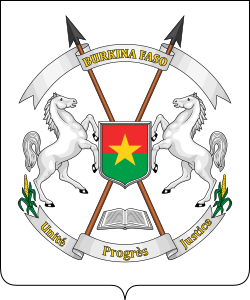 |
|---|
The Union for a New Burkina (French : Union pour un Burkina Nouveau, UBN) is a political party in Burkina Faso.
 |
|---|
The Union for a New Burkina (French : Union pour un Burkina Nouveau, UBN) is a political party in Burkina Faso.
The UBN was formed on 14 February 2015, [1] based on an association established in 2011 following the 2011 Burkinabé protests. [2] Former Minister of Sport Yacouba Ouédraogo was appointed party president. [1] In the 2015 general elections it received 0.86% of the vote, winning one of the constituency seats (Ag Amlaouna Agali in Oudalan Province). [3]
On 29 January 2026, all parties, including this one, were dissolved through decree by the junta government in Burkina Faso. [4] [5]